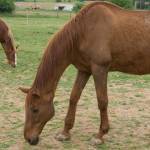Putting Weight on a Thin Horse: Just the Basics

The first step to helping a clinically normal horse gain weight is to determine how much digestible energy the horse should receive each day to meet its maintenance requirements. The second step is to estimate the amount of weight the horse should gain to achieve the desired condition score. The third step is to determine the number of days available to accomplish this weight gain. For example, if you would like a mare to gain enough weight to increase her condition score from a 4 to a 5 before the onset of the breeding season (February 1), you will have 120 days if you start on October 1, but only 60 days if you wait until December 1.
Finally, you will have to calculate the amount of digestible energy needed to achieve the desired daily weight gain. The shorter the available time to change body weight, the higher the amount of digestible energy that must be fed. Some horses in poor body condition may already have suboptimal gastrointestinal health (such as racehorses on lay-up), so diets that promote normal gastrointestinal function should be used.
The higher the quality of the forage, the higher the expected forage intakes and the lower the amount of concentrate that will be needed. When 90 days are available, the diet could consist of about 10 kg (22 lb) of good-quality forage and 2 to 3 kg (4.4 to 6.6 lb) of concentrate. When only 30 days are available, a very high level of concentrate (6 to 8 kg, or 13.2 to 17.6 lb) will be needed even if high-quality forage is available. This level of concentrate is not ideal for gastrointestinal health.
Management programs should allow for longer periods of time to adjust body weights so that it is not necessary to feed extremely high levels of concentrate.
If a horse is being exercised, then additional energy must be fed to meet the needs for exercise. An alternative is to reduce daily energy expenditure (exercise) to make it easier to achieve a positive energy balance.
Read more from Advances in Equine Nutrition IV.








